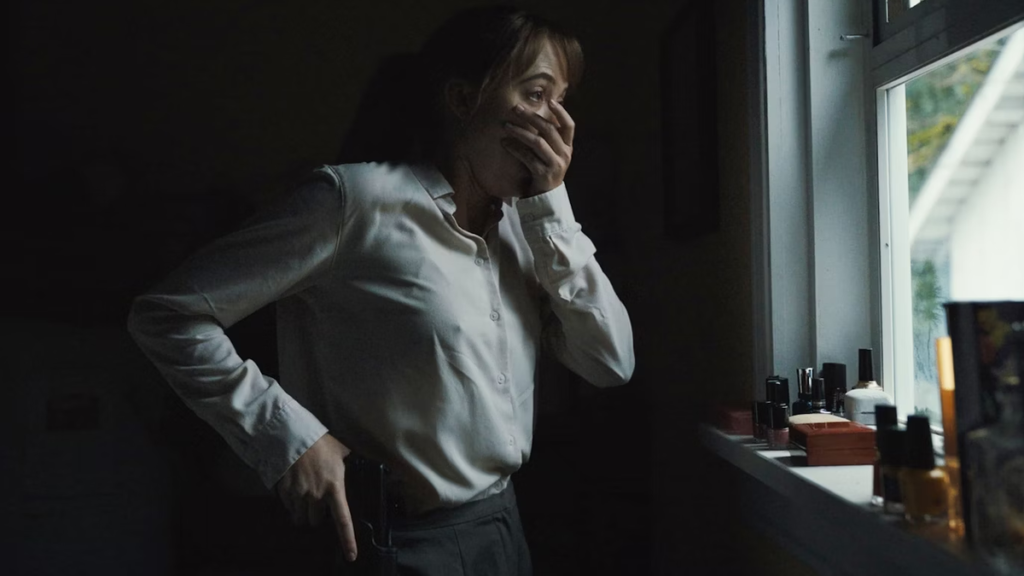A still from ‘Longlegs’
| Photo Credit: NEON
Neon’s relentless marketing campaign for Osgood Perkins’ fourth feature successfully wove tall tales (and even longer legs) that painted it as a descent into unspeakable terror, with social media teasers and cryptic trailers suggesting a full-blown fright fest. But as with any good horror story, there’s more beneath the surface. Far from the gore-drenched scream-fest the publicity machine has hinted at, Longlegs is a masterclass in subtlety. It’s a film that doesn’t lunge at you with desperate thrills but rather oozes into your subconscious, settling there like a sinister squatter you can’t evict. Perkins’ direction weaves a web of atmospheric dread, making the real horror not what you hear or see, but what feels like gradually peeling your own nails off bit by bit.
The plot seems straightforward enough. An FBI agent is tasked with investigating a series of gruesome family murders spanning decades, all marked by cryptic notes signed “Longlegs.” The deeper she digs, the more tangled the web becomes. Longlegs is a specter, always a step ahead, always watching. The sense of impending doom is excruciating, and Perkins ensures that it never lets up.
Longlegs (English)
Director: Osgood Perkins
Cast: Maika Monroe, Nicholas Cage, Alicia Witt, Kiernan Shipka, Blair Underwood
Runtime: 101 minutes
Storyline: FBI Agent Lee Harker is assigned to an unsolved serial killer case that takes an unexpected turn, revealing evidence of the occult
A masterful blend of procedural crime-thrillers with a garnish of the occult and wrapped in a shroud of relentless dread, Longlegs is a brooding descent into a Satanic fever dream. It dabbles less in the conventions of jumpscare-ridden terror and more a slow-burning, dreadful march into the abyss — a sensation only accentuated by a campy, nightmare performance from a chameleonic Nicholas Cage.
The film is a journey into the twisted psyche of Nic Cage’s creepy titular reprobate, who once again proves he’s the go-to for characters that make you want to sleep with the lights on. Sporting a whiny voice, long mousy blond hair, and a face slathered in grotesque, pale makeup and prosthesis, he is first introduced in a 1974 prologue that sets the stage for the terror to come, with Cage having effortlessly transform himself into an androgynous figure of unearthly legend. His seasoned eccentricities seem to have funneled themselves into creating a character who could make Pennywise seem like a tame birthday clown. His sickly body language and saccharine intonation — it’s all designed to make your skin crawl. The performance is the kind of unsettling that makes you want to scrub your brain clean after watching.
A still from ‘Longlegs’
| Photo Credit:
NEON
Longlegs is often seen in half-light, his grotesque features only partially revealed, leaving much to the imagination. When his full visage is finally exposed, it’s a jarring payoff that feels inevitable and shockingly fresh. Cage’s portrayal is a terrifying tour de force, blending elements of Ted Levine’s Buffalo Bill with a level of unhinged that’s characteristically Nic Cage.
On the flipside, contemporary horror veteran Maika Monroe plays FBI Agent Lee Harker: a muted counterpoint to Jodie Foster’s Clarice Starling and in stark contrast to the frenetic energy of Cage’s Longlegs. Monroe’s performance is taut and understated. She’s haunted by her past, and as the film progresses, you realise that the real evil might not (just) be Longlegs after all.
Perkins’ builds the film’s tension with delicious precision; every scene, every frame, calibrated to elicit maximum discomfort. He smartly implies more than he shows, allowing the audience’s imagination to fill in the horrific blanks making Longlegs feel like a lucid, waking nightmare.
The film’s visuals, courtesy of cinematographer Andres Arochi Tinajero, are a study in contrasts, with its underlit scenes, ominous wides and suffocating 4:3 flashbacks trapping us and its characters in a perpetual state of unease. The complementing sound design by Eugenio Battaglia and the disconcerting score by Zilgi gnaw at your very soul, creating a sonic ordeal that leaves a lasting, sinister spell.
The film’s themes seemingly hit close to home for Perkins, whose family history is steeped in its own dark secrets. The filmmaker’s macabre lineage, as the child of closeted-gay Psycho star Anthony Perkins, and Berry Berensen (who died in the September 11 attacks as a passenger on the first plane that struck the World Trade Center) seems to permeate his twisted vision on familial trauma. With Longlegs, he leans into his strengths, creating a film that’s as much about what’s unseen and unsaid as it is a stylishly crafted modern horror marvel.
For those expecting to cower in their seats at the “scariest film of the decade,” it is my civic duty to temper your expectations: Longlegs will probably not meet the inflated legend that preceded it. Instead, what it delivers is a remarkably unsettling experience, an exquisite lesson in atmospheric horror. This film isn’t content with just scaring you; it exists solely to haunt your psyche, to weave itself into the crevices of your mind, lingering long after the credits roll in reverse, as if descending into the inferno itself.
Longlegs is currently running in theatres

